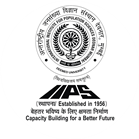- About IIPS
- Academics
- Study @ IIPS
- Departments
- Centres
- Controller of Examination
- Programme
- Distance and Online Education
- Training
- Facilities/Services
- Resources
- Virtual Learning
- Digital Initiatives (MHRD)
- Notice
- Seminars / Workshops / Conferences
- Conferences
- Publications
- Seminars
- Sponsored Research
- Workshops
- Collaboration
- National
- International
- NEP 2020
- Admission
- Courses
- Admission Bulletin
- TIME-TABLE For Admission 2025-26
- Model Question Papers
- Programme Coordinators
- Fellowships
- Academic Calendar
- International Students
- Visa Information
- Administration
- Faculty & Staff
- Research & Publications
- Library
- Information
- Right to Information
- Vigilance Officer
- Annual Report
- Director's Report
- Cells & Commitees
- Cells
- Commitees
- Committees of NEP 2020
- Staff Walfare Committee
- Cultural Committee
- Internal Committee
- Purchase Commitee
- Students Academic Committee
- Student Research Ethics Committee
- Anti-Ragging Committee
- Institutional Review Board
- Social Media Committee
- Prevention of Caste-based Discrimination Committee
- Code of Conduct and Professional Ethics
- National and International honours, Awards, Recognition, and Medals
- Online Facilities
- Employee's Corner
- Memorial Lectures
- Convocation
- IIPS Newsletters
- COVID 19 Information
- Life @ IIPS
Evolving Family Dynamics and Redefining Support for Functionally Impaired Elderly in India?
- Home
- Evolving Family Dynamics and Redefining Support for Functionally Impaired Elderly in India?
Abstract Content (not more than 300 word, should include: Introduction, Objective, Methodology, critical findings & Conclusion):
Introduction
In India, families have long been central to elderly care, but evolving demographic, social, and economic changes are redefining these traditional roles. As India navigates toward the complexities of an aging population with limited formal support in terms of hospitalization, old age homes, & other senior care facilities, rethinking the unmet care needs of these elderly populations at the familial level is crucial to ensuring their care and support & well-being.
Methodology
Using LASI data, study examined the provisions of care and support for the elderly. Our analysis was based on the 14,320 elderly aged 60+ in India who actually need care in their activities of daily living. Using logistic regression, we explored the intricate relationships between living arrangements, spousal presence, and children’s proximity to their caregiving choices among the functionally impaired elderly in India.
Results
We found a very high unmet need for assistance among older adults. One out of two older adults in India has at least one functional limitation (48%), and only 23% of them receive assistance in their daily needs from family members. Although co-residential families remain the main caregivers, yet nearly 10% of the elderly lack any primary caregiver, highlighting emerging vulnerabilities as traditional co-residential care patterns decline. Elderly with three or more functional limitations are nearly three times more likely to receive spousal care (OR = 2.92), while those living alone face higher odds of having no caregiver.
Discussion
In recent years, demographic shifts have transformed family dynamics and elderly support patterns, yet the significance of family bonds remains largely undiminished. Given the current program and policy response, little has been focused on institutionalized support. Therefore, creating awareness at family level and emphasizing more on existing policies is needed to provide elderly a life with dignity they deserve.
Abstract theme:
In case of not been selected for oral presentation, do you want to be considered for the poster presentation ?:
Yes
Do you require financial support to attend the seminar ? (Not applicable for virtual meet):
Yes-full
Gender:
Male
Evaluation Status:
No
